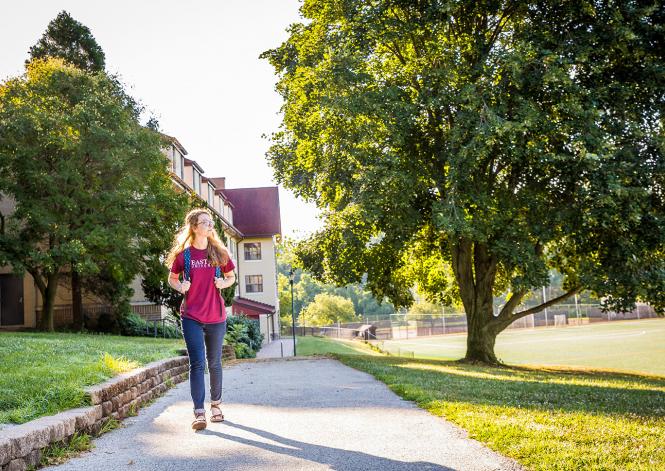
Micah Skinner, a graduating senior from the Honors College, has attended the annual Honors camping trip in the Adirondacks all four years of his Templeton career, first as an incoming freshman himself and later as student staff. This is a list of advice he has composed to share with first years during the camping trip. Though it is geared towards students just beginning their time in the Honors College, his advice might still prove helpful for upperclassmen in the Honors College, and also those beginning their time in the University more broadly.
- Never start a paper less than 24 hours before it’s due.
- Never buy anything from the bookstore. You can find it cheaper on Amazon, I promise.
- Don’t rent books for your Templeton classes. If a professor assigns a text, they think it’s worth having on your bookshelf for the rest of your life. (Buying used is okay.)
- Find a church! It’s easy to feel like you’re getting spiritual formation because we talk about God very often in class. Your studies are never supposed to replace worshipping weekly with an intentional community.
- Start saying “it’s not a priority” instead of “I don’t have time” in your internal dialogue. It’ll keep you more honest, and reveal what your real priorities are.
- It may seem counter-intuitive, but being deliberate and proactive about taking a Sabbath, a day set apart for worship and leisure, will invariably guard against procrastination and sloth. (Corollary: in the Jewish tradition, each day begins at sundown, not sunrise. The day ought to begin in the quiet rhythms and settling of life. Rest is not something we do to recover from work. Rather, work is something we do out of an abundance of rest.)
- Read C.S. Lewis’s essays “Learning in War-time” and “On Reading Old Books”. They’re great short introductions to why a liberal arts education is important.
- If you’re not excited to go to a THC class, something is wrong. Maybe you’re not getting enough sleep, maybe you’re not spending enough time outside of class to actually read and prepare well, maybe you’re getting too easily annoyed by professors or classmates, maybe you’re too stressed and feel like you don’t have the time to go to class, etc. It could be a hundred things, and only you can figure it out, but it’s worth keeping in mind.
- Your professors in the THC care about you, and they want to see you. Go to their office if you’re struggling with something in their class, or if you have a question, etc. (Don’t forget that they are also invariably very busy.)
- There will be weeks where you feel like you can’t do everything in time. That’s okay. Take a deep breath, and then prioritize.
- Always ask a friend (or even a sibling, or parent) to read your papers. Your thoughts make perfect sense to you because they came from your brain – a friend will much more quickly show how arguments can be tightened and clarified.
- The first and last thing you do every day will surely influence what you do in between.
- Let books change you. Be vulnerable. Being willing to emerge a slightly different person requires vulnerability
- First impressions aren’t everything. Don’t let quick judgements freshman year prevent potential deep friendships for the next 4+ years.
- The rest of your cohort is likely coming from different and unique educational backgrounds. Let their intellectual strengths inspire you, not intimidate you. Let their intellectual weaknesses be an opportunity for service, not for derision.
- Always give the most charitable interpretation to those around you. You have no idea what kind of baggage or history those around you may share, or what kind of hard battles you can’t fathom they’re struggling with.
- Always give the most charitable interpretation to the books you read. Those voices, perhaps long since dead, are likely much smarter than you and we wouldn’t be reading them if they didn’t have something for us to learn. (You can still argue with them, but you have to understand their strongest arguments first.)
- Don’t confuse wisdom with memory. If there’s a single character, argument, picture, quote or hell, even a single phrase, that changed you, then the book was worth reading. The way you see the world can still be changed by books you have long since mostly forgotten.
Micah Skinner is currently a Senior in the Templeton Honors College, studying Mathematics with a minors in Political Science and Astronomy. His other academic interests include computer engineering, film, and philosophy. When he’s not annoying his friends by referencing C.S. Lewis, he spends his free time accumulating rust on his Hebrew vocabulary, reading fantasy novels, and pursuing laughter wherever it may be found.








